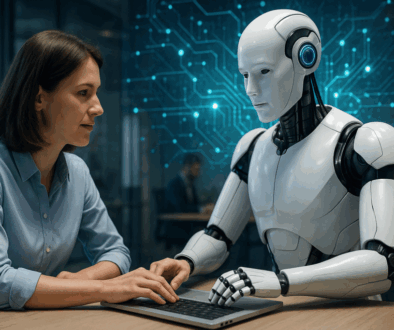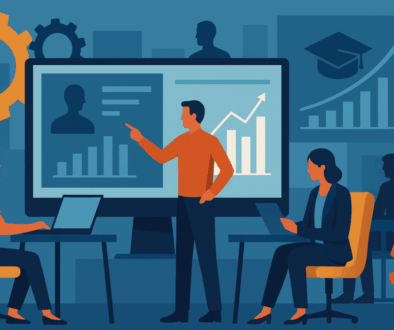Transforming Talent Management with AI. The Future is Here
Edition 25-001| 14-Aug-2025
In today’s competitive business landscape, human resource (HR) functions are undergoing a profound transformation. At the center of this shift is artificial intelligence (AI), a technology that is no longer a futuristic concept but a practical tool already reshaping how organizations attract, manage, and retain talent. From streamlining recruitment to enhancing employee engagement, AI is delivering measurable gains in workforce productivity and organizational efficiency.
AI’s Role in Modern Human Resource Management
AI in HR is more than automation—it’s about enabling data-driven decision-making. Traditional HR processes often rely on manual input, intuition, and reactive approaches. AI introduces predictive analytics, natural language processing, and machine learning models that identify patterns, anticipate needs, and recommend actions, enabling HR be play a much more strategic role as an organizational partner rather than a mere administrative function.
For example, AI-powered recruitment platforms can scan thousands of resumes in seconds, rank candidates by relevance, and even predict cultural fit based on historical hiring data. In employee relations, sentiment analysis tools can gauge workforce morale by analyzing internal communications, while AI-driven learning platforms recommend personalized training paths.
By integrating these capabilities into the HR tech stack, organizations gain speed, accuracy, and foresight—qualities essential in an every changing, dynamic labor market.
How AI Integrates into HR Processes
- Talent Acquisition – AI-driven applicant tracking systems (ATS) and resume parsing tools significantly reduce time-to-hire. Some platforms now offer conversational AI chatbots that engage candidates 24/7, answer questions, and schedule interviews without human intervention.
- Onboarding – AI automates onboarding checklists, ensuring that new hires receive the right resources, training modules, and introductions tailored to their role. Virtual assistants can guide employees through company policies, benefits enrollment, and IT setup.
- Performance Management – Machine learning models analyze performance data to identify high-potential employees, forecast attrition risk, and recommend career development paths. This allows managers to proactively address performance gaps and nurture talent pipelines.
- Learning & Development – Adaptive learning systems use AI to assess skills and recommend training programs that match both organizational needs and individual career goals, creating more engaged and capable employees.
- Workforce Planning – Predictive analytics help HR leaders forecast staffing needs, identify skill shortages, and model different workforce scenarios—critical for strategic agility.
- Employee Engagement & Retention – Sentiment analysis tools can detect early warning signs of disengagement, enabling timely interventions to improve satisfaction and reduce turnover.
We will cover each of these in-depth in future articles.
Impact on Workforce Productivity and Organizational Efficiency
The most immediate benefit of AI in HR is operational efficiency. Administrative tasks that once took days can now be completed in minutes, freeing HR professionals to focus on strategic initiatives such as leadership development and culture-building.
AI also improves decision quality. For example, predictive hiring models not only speed up recruitment but also improve candidate-job alignment, reducing costly turnover. Similarly, AI-driven scheduling tools can optimize shift assignments, balancing business needs with employee preferences to minimize burnout and absenteeism.
On the productivity front, AI supports a more personalized employee experience. By tailoring training, career opportunities, and even work schedules, organizations can boost engagement—a key driver of performance. Engaged employees are more productive, more innovative, and more likely to remain with their employer.
Practical Applications Businesses Can Implement Today
For companies looking to harness AI in HR, the starting point doesn’t have to be a complete system overhaul. Practical, high-impact applications include:
- AI-Powered Recruitment Tools: Integrating intelligent candidate sourcing platforms that screen and shortlist applicants automatically.
- Chatbots for HR Support: Providing 24/7 answers to routine HR questions, reducing support tickets and response times.
- Automated Onboarding Workflows: Using AI to assign and track onboarding tasks, ensuring consistency across the organization.
- Predictive Retention Models: Identifying at-risk employees early so HR teams can take preventive action.
- Personalized Learning Platforms: Delivering AI-curated training content based on role requirements and employee aspirations.
These initiatives can be piloted in specific departments or regions before scaling organization-wide.
Future Trends Shaping AI in HR
Looking ahead, several trends will define the next phase of AI in workforce management:
- Hyper-Personalization – AI will enable tailored experiences at scale, from custom career paths to individualized wellness programs.
- Ethical AI and Transparency – As algorithms play a bigger role in hiring and promotion decisions, there will be greater demand for explainable AI to ensure fairness and compliance.
- Integration with Employee Well-Being – AI will connect wellness data (sleep, stress, workload) with productivity metrics, enabling proactive health interventions.
- Voice and Conversational Interfaces – Voice-driven HR assistants will become common, allowing employees to interact with HR systems as naturally as they would with a colleague.
- Cross-Functional Data Integration – AI will pull from finance, operations, and customer data to create a holistic view of workforce impact, aligning HR strategy with business performance.
We will cover each of these topics in greater detail in future articles
Navigating the Transformation
Adopting AI in HR requires careful planning. Organizations must address data privacy, bias mitigation, and change management to build trust among employees. Training HR teams to interpret AI insights is equally critical; AI is most effective when combined with human judgment.
In the end, AI is not replacing HR professionals—it’s amplifying their capabilities. By automating repetitive tasks and providing deeper insights, AI allows HR to focus on what it does best: fostering a workforce that drives business success.




